Abstract
In a randomised, double-blind placebo-controlled trial, the effects of the administration of oral L-carnitine (2 g/day) for 28 days were compared in the management of 51 (carnitine group) and 50 (placebo group) patients with suspected acute myocardial infarction. At study entry, the extent of cardiac disease, cardiac enzymes and lipid peroxides were comparable between the groups, although both groups showed an increase in cardiac enzymes and lipid peroxides. At the end of the 28-day treatment period, the mean infarct size assessed by cardiac enzymes showed a significant reduction in the carnitine group compared to placebo. Electrocardiographic assessment of infarct size revealed that the QRS-score was significantly less in the carnitine group compared to placebo (7.4 +/- 1.2 vs 10.7 +/- 2.0), while serum aspartate transaminase and lipid peroxides showed significant reduction in the carnitine group. Lactate dehydrogenase measured on the sixth or seventh day following infarction showed a smaller rise in the carnitine group compared to placebo. Angina pectoris (17.6 vs 36.0%), New York Heart Association class III and IV heart failure plus left ventricular enlargement (23.4 vs 36.0%) and total arrhythmias (13.7 vs 28.0%) were significantly less in the carnitine group compared to placebo. Total cardiac events including cardiac deaths and nonfatal infarction were 15.6% in the carnitine group vs 26.0% in the placebo group. It is possible that L-carnitine supplementation in patients with suspected acute myocardial infarction may be protective against cardiac necrosis and complications during the first 28 days.
Full text
PDF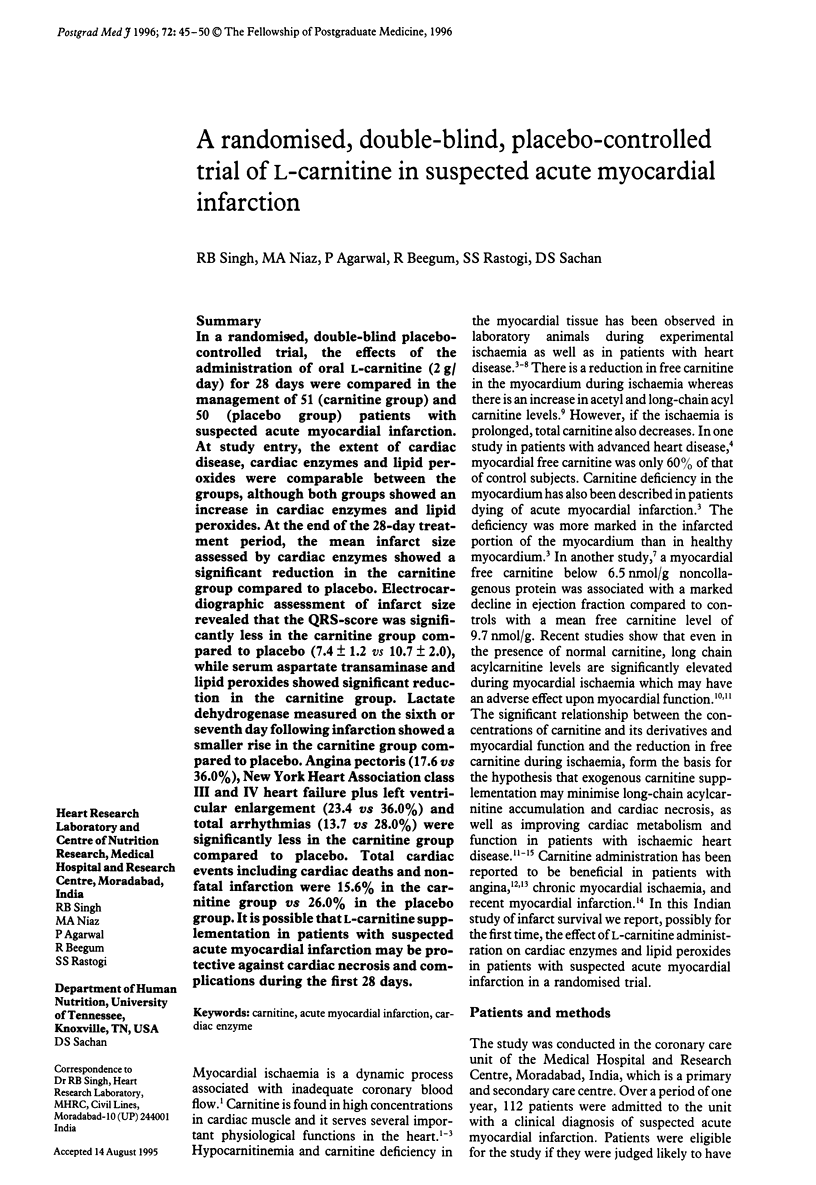
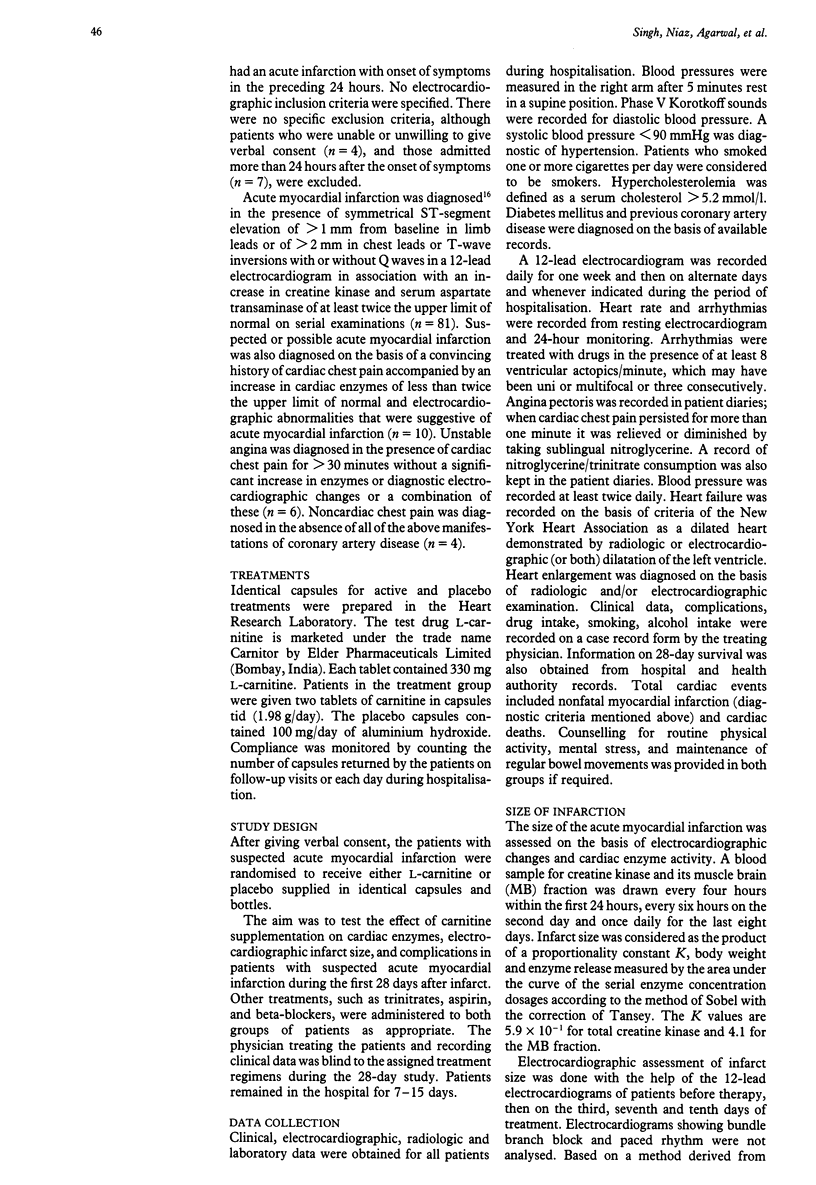
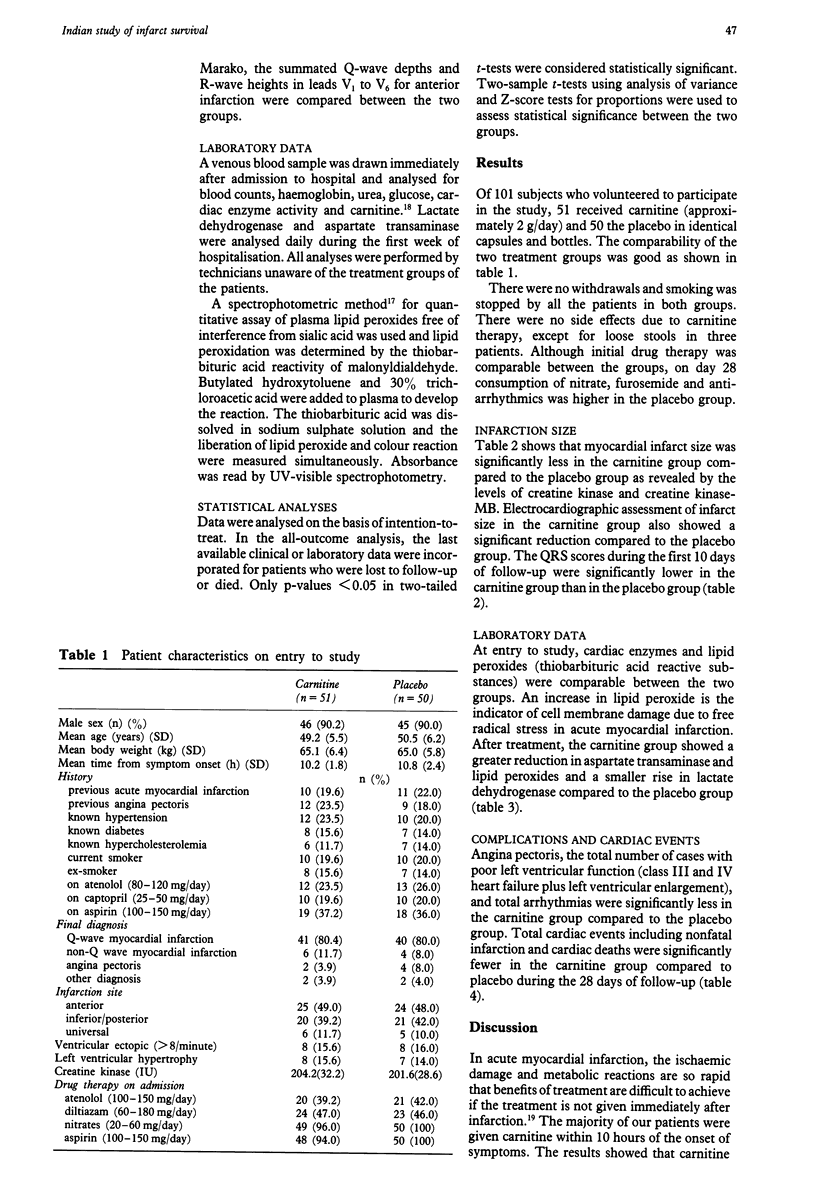
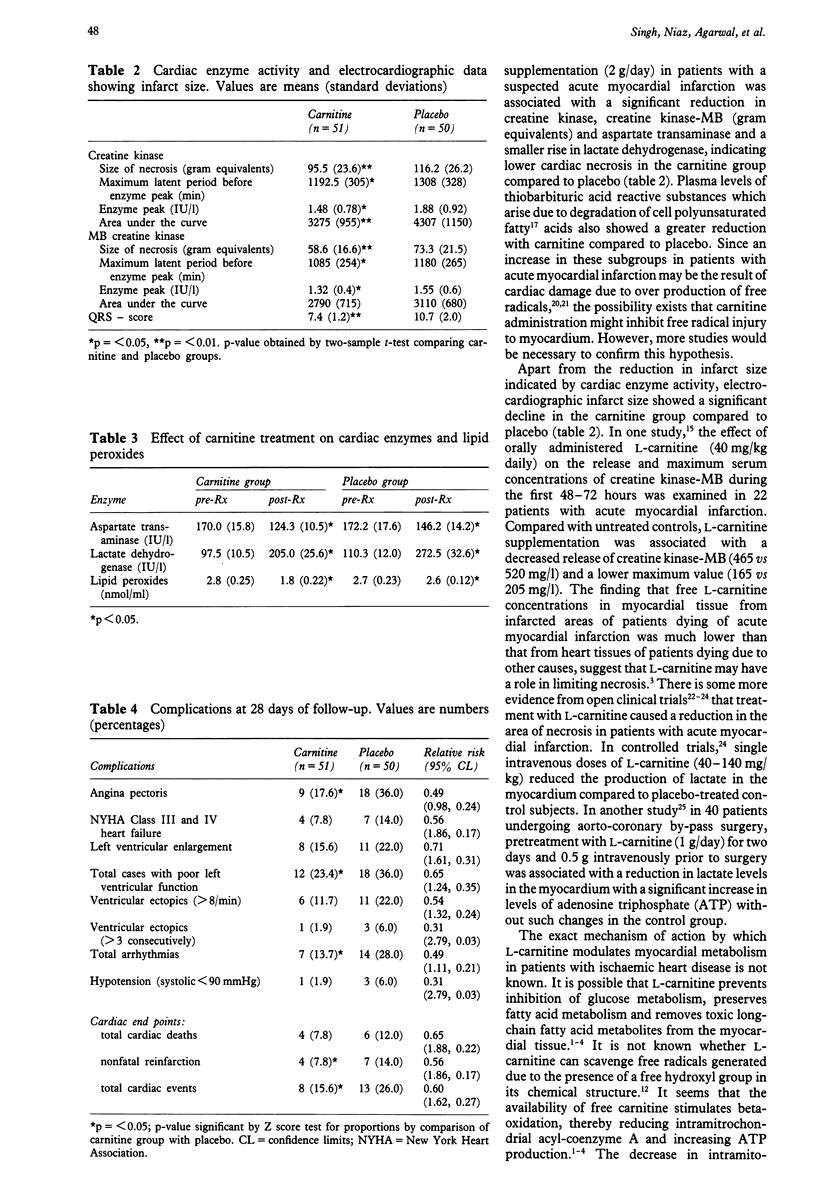
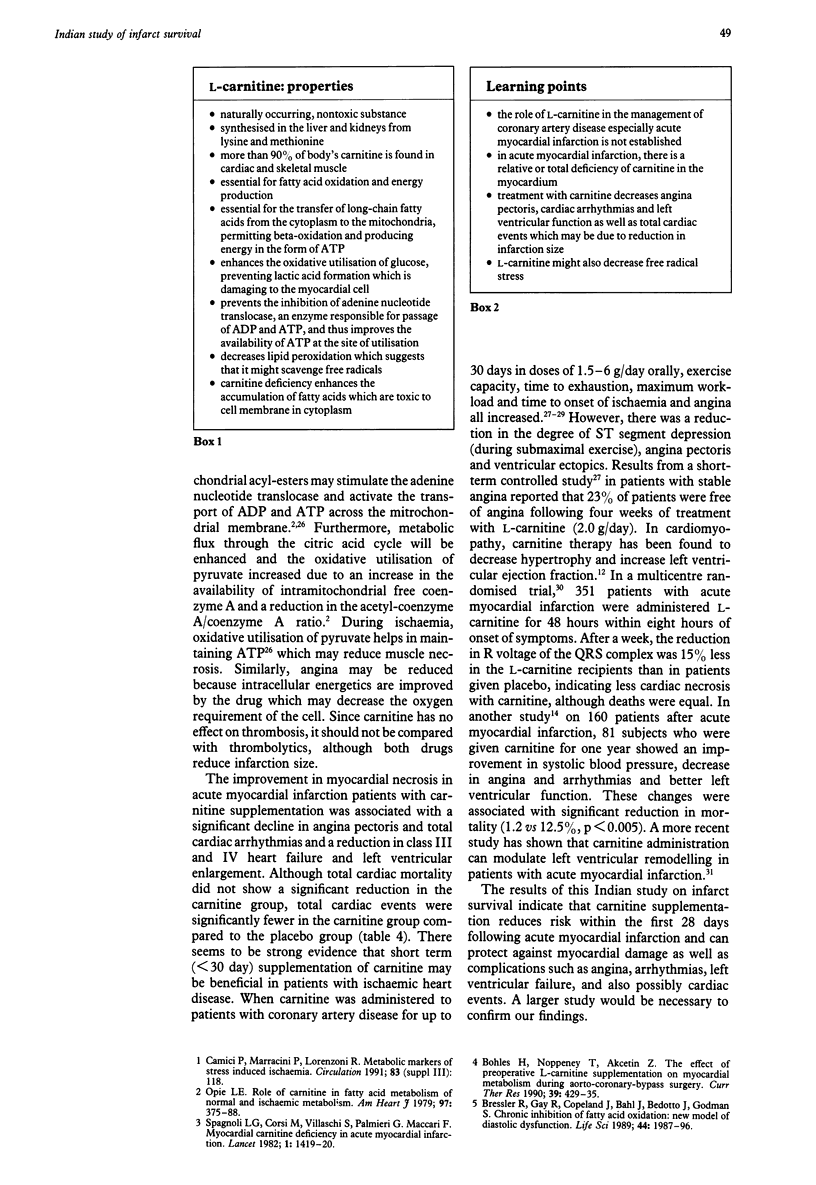
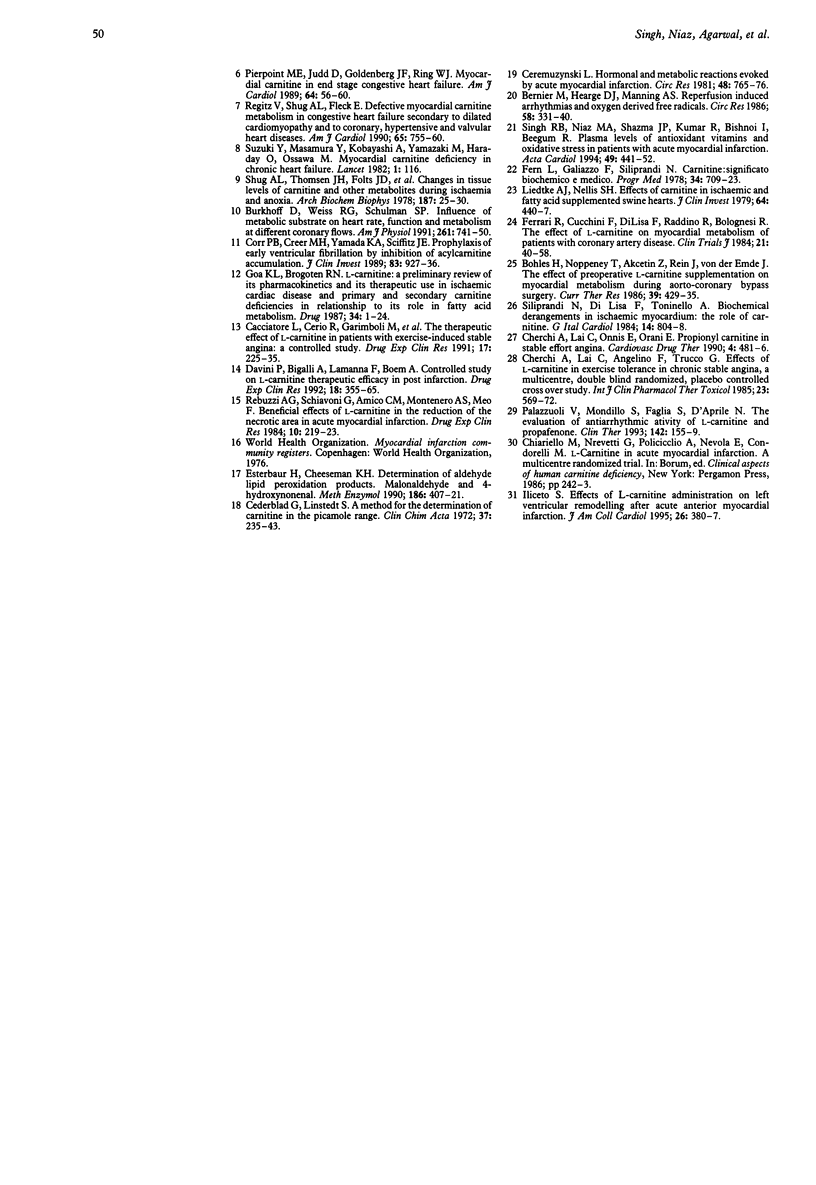
Selected References
These references are in PubMed. This may not be the complete list of references from this article.
- Bernier M., Hearse D. J., Manning A. S. Reperfusion-induced arrhythmias and oxygen-derived free radicals. Studies with "anti-free radical" interventions and a free radical-generating system in the isolated perfused rat heart. Circ Res. 1986 Mar;58(3):331–340. doi: 10.1161/01.res.58.3.331. [DOI] [PubMed] [Google Scholar]
- Cacciatore L., Cerio R., Ciarimboli M., Cocozza M., Coto V., D'Alessandro A., D'Alessandro L., Grattarola G., Imparato L., Lingetti M. The therapeutic effect of L-carnitine in patients with exercise-induced stable angina: a controlled study. Drugs Exp Clin Res. 1991;17(4):225–235. [PubMed] [Google Scholar]
- Cederblad G., Lindstedt S. A method for the determination of carnitine in the picomole range. Clin Chim Acta. 1972 Mar;37:235–243. doi: 10.1016/0009-8981(72)90438-x. [DOI] [PubMed] [Google Scholar]
- Cherchi A., Lai C., Angelino F., Trucco G., Caponnetto S., Mereto P. E., Rosolen G., Manzoli U., Schiavoni G., Reale A. Effects of L-carnitine on exercise tolerance in chronic stable angina: a multicenter, double-blind, randomized, placebo controlled crossover study. Int J Clin Pharmacol Ther Toxicol. 1985 Oct;23(10):569–572. [PubMed] [Google Scholar]
- Cherchi A., Lai C., Onnis E., Orani E., Pirisi R., Pisano M. R., Soro A., Corsi M. Propionyl carnitine in stable effort angina. Cardiovasc Drugs Ther. 1990 Apr;4(2):481–486. doi: 10.1007/BF01857757. [DOI] [PubMed] [Google Scholar]
- Corr P. B., Creer M. H., Yamada K. A., Saffitz J. E., Sobel B. E. Prophylaxis of early ventricular fibrillation by inhibition of acylcarnitine accumulation. J Clin Invest. 1989 Mar;83(3):927–936. doi: 10.1172/JCI113978. [DOI] [PMC free article] [PubMed] [Google Scholar]
- Davini P., Bigalli A., Lamanna F., Boem A. Controlled study on L-carnitine therapeutic efficacy in post-infarction. Drugs Exp Clin Res. 1992;18(8):355–365. [PubMed] [Google Scholar]
- Ende N., Rameshwar P., Ende M. Fetal cord blood's potential for bone marrow transplantation. Life Sci. 1989;44(25):1987–1990. doi: 10.1016/0024-3205(89)90412-8. [DOI] [PubMed] [Google Scholar]
- Esterbauer H., Cheeseman K. H. Determination of aldehydic lipid peroxidation products: malonaldehyde and 4-hydroxynonenal. Methods Enzymol. 1990;186:407–421. doi: 10.1016/0076-6879(90)86134-h. [DOI] [PubMed] [Google Scholar]
- Goa K. L., Brogden R. N. l-Carnitine. A preliminary review of its pharmacokinetics, and its therapeutic use in ischaemic cardiac disease and primary and secondary carnitine deficiencies in relationship to its role in fatty acid metabolism. Drugs. 1987 Jul;34(1):1–24. doi: 10.2165/00003495-198734010-00001. [DOI] [PubMed] [Google Scholar]
- Iliceto S., Scrutinio D., Bruzzi P., D'Ambrosio G., Boni L., Di Biase M., Biasco G., Hugenholtz P. G., Rizzon P. Effects of L-carnitine administration on left ventricular remodeling after acute anterior myocardial infarction: the L-Carnitine Ecocardiografia Digitalizzata Infarto Miocardico (CEDIM) Trial. J Am Coll Cardiol. 1995 Aug;26(2):380–387. doi: 10.1016/0735-1097(95)80010-e. [DOI] [PubMed] [Google Scholar]
- Liedtke A. J., Nellis S. H. Effects of carnitine in ischemic and fatty acid supplemented swine hearts. J Clin Invest. 1979 Aug;64(2):440–447. doi: 10.1172/JCI109481. [DOI] [PMC free article] [PubMed] [Google Scholar]
- Opie L. H. Role of carnitine in fatty acid metabolism of normal and ischemic myocardium. Am Heart J. 1979 Mar;97(3):375–388. doi: 10.1016/0002-8703(79)90440-x. [DOI] [PubMed] [Google Scholar]
- Palazzuoli V., Mondillo S., Faglia S., D'Aprile N., Camporeale A., Gennari C. Valutazione dell'attività antiaritmica della L-carnitina e del propafenone nella cardiopatia ischemica. Clin Ter. 1993 Feb;142(2):155–159. [PubMed] [Google Scholar]
- Pierpont M. E., Judd D., Goldenberg I. F., Ring W. S., Olivari M. T., Pierpont G. L. Myocardial carnitine in end-stage congestive heart failure. Am J Cardiol. 1989 Jul 1;64(1):56–60. doi: 10.1016/0002-9149(89)90653-x. [DOI] [PubMed] [Google Scholar]
- Regitz V., Shug A. L., Fleck E. Defective myocardial carnitine metabolism in congestive heart failure secondary to dilated cardiomyopathy and to coronary, hypertensive and valvular heart diseases. Am J Cardiol. 1990 Mar 15;65(11):755–760. doi: 10.1016/0002-9149(90)91383-h. [DOI] [PubMed] [Google Scholar]
- Shug A. L., Thomsen J. H., Folts J. D., Bittar N., Klein M. I., Koke J. R., Huth P. J. Changes in tissue levels of carnitine and other metabolites during myocardial ischemia and anoxia. Arch Biochem Biophys. 1978 Apr 15;187(1):25–33. doi: 10.1016/0003-9861(78)90003-6. [DOI] [PubMed] [Google Scholar]
- Siliprandi N., Di Lisa F., Toninello A. Biochemical derangements in ischemic myocardium: the role of carnitine. G Ital Cardiol. 1984 Oct;14(10):804–808. [PubMed] [Google Scholar]
- Singh R. B., Niaz M. A., Sharma J. P., Kumar R., Bishnoi I., Begom R. Plasma levels of antioxidant vitamins and oxidative stress in patients with acute myocardial infarction. Acta Cardiol. 1994;49(5):441–452. [PubMed] [Google Scholar]
- Spagnoli L. G., Corsi M., Villaschi S., Palmieri G., Maccari F. Myocardial carnitine deficiency in acute myocardial infarction. Lancet. 1982 Jun 19;1(8286):1419–1420. doi: 10.1016/s0140-6736(82)92540-5. [DOI] [PubMed] [Google Scholar]
- Suzuki Y., Masumura Y., Kobayashi A., Yamazaki N., Harada Y., Osawa M. Myocardial carnitine deficiency in chronic heart failure. Lancet. 1982 Jan 9;1(8263):116–116. doi: 10.1016/s0140-6736(82)90263-x. [DOI] [PubMed] [Google Scholar]


